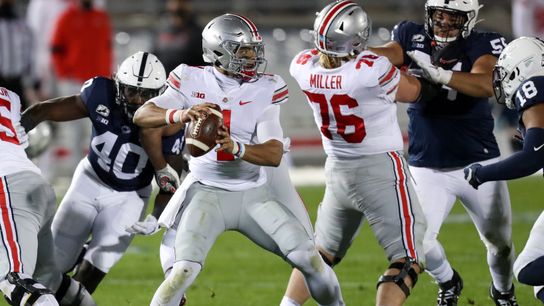It would be tempting to pinpoint Tate Martell is the one person who singlehandedly closed the transfer loophole that seemed to consume college football for a year or so. After all, it was soon after Martell's move from Ohio State to Miami was granted an immediate thumbs up from the NCAA that the NCAA announced it will take a look at the loophole that made his move possible.
But that would be incorrect.
If you're going to pinpoint one person, it's definitely Tom Mars. The Rogers, Ark., based attorney basically became kingpin of an overnight industry. Mars got Shea Patterson immediately eligible at Michigan after his transfer from Ole Miss last April and got Justin Fields eligible at Ohio State in February following his departure from Georgia earlier this year.
So successful was Mars -- who, by the way, was also indirectly responsible for Hugh Freeze's resignation at Ole Miss, due to his work representing Houston Nutt in his suit against the school -- that he became a de facto member of the compliance staff for a number of college football programs. "Commit to us and Tom will make sure you're eligible."
In his work, Mars became akin to a priest working a confessional booth -- plenty of coaches who were against the concept of immediately-eligible transfers in public happened to be for them in private, when their team stood to benefit.
That's in the past now, though. Mars got out of the game last month, when the NCAA hired him to work as an "independent external advocate" for the organization's Complex Case Unit. If the NCAA's legal system were a cop show, Mars would be the grizzled, chain-smoking veteran detective the New York P.D. turns to once or twice a season when the regular cops can't figure that week's suspect out.
No matter what side of the table Mars happens to sit, his opinion on the issue of transfers and waivers is worth paying attention to, especially when he tells Sports Illustratedsomething like this:
“I think there is a real good possibility that within the next year, the legislative council will throw out what’s on the books and replace it with a one-time transfer-without-penalty rule,” Mars says.
If such a change were to pass, it would mean that, yes, free agency would fully arrive in college football. Every player's scholarship papers would come equipped with one get-out-of-jail-free card, to be cashed in whenever they so desire.
Shocking to the system as that would be, I believe coaches would ultimately come to prefer that system over the one we have now.
In 2018, the NCAA loosened its restrictions, allowing players with "mitigating circumstances" that affect their academic and personal well-being outside of that player's control to be granted immediate eligibility. It's a loophole wide enough to fit an entire circus inside. This year the NCAA altered the wording, now requiring "extenuating, extraordinary and mitigating circumstances." The current rules also put the ball in the departing school's court, where if a player's previous school doesn't approve his immediate eligibility waiver he's likely to get one, and if they do oppose it, he doesn't.
This was the source of the beef between Michigan's Jim Harbaugh and Cincinnati's Luke Fickell after former Wolverine, current Bearcat James Hudson was denied immediate eligibility by the NCAA.
It's a system, well intentioned as it may be, that's bound to frustrate everyone in the sport at one time or another.
Coaches, like everyone else, want rules they believe are fair and just. Short of that, though, they want to know that they're playing by the same rules as everyone else and that those rules will be applied equally across the board.
There's never going to be a one-size-fits-all transfer system that satisfies all involved parties -- not with 130 schools and some 11,000 scholarship players. But a one-time-waiver system might just be the compromise everyone can agree on the most -- or, perhaps, disagree with the least.
